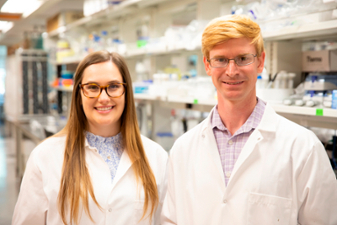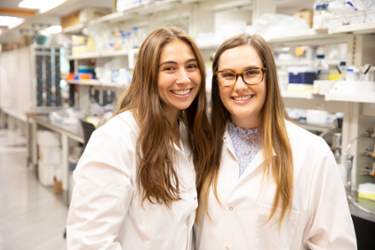Recent Miami University graduate Lexie Adams receives American Institute of Chemical Engineers award
Lexie Adams, a May 2021 Miami University graduate, has recently received the 2022 AIChE Pharmaceutical Discovery, Development, and Manufacturing Forum Student Award for her research during her time working in Dr. Andrew Jones’s lab at Miami.

Recent Miami University graduate Lexie Adams receives American Institute of Chemical Engineers award
By Gabby Benedict, CEC Student Intern
Lexie Adams is a 2021 Miami University graduate and recently received the 2022 AIChE Pharmaceutical Discovery, Development, and Manufacturing Forum Student Award for her work involving the genetic and metabolic engineering of E. coli.
The American Institute of Chemical Engineers (AIChE) chooses winners for the award based on their contributions to the research in or application of innovative solutions to technological problems, and/or the commercialization of new pharmaceutical processes and products.
 While working in a lab with Andrew Jones, a Miami assistant professor in the Department of Chemical, Paper and Biomedical Engineering, Adams worked on a novel bacterial strain for the production of psilocybin and developed the E. coli strain. (Adams, right, and her mentee, current Miami senior Jessica Flower.)
While working in a lab with Andrew Jones, a Miami assistant professor in the Department of Chemical, Paper and Biomedical Engineering, Adams worked on a novel bacterial strain for the production of psilocybin and developed the E. coli strain. (Adams, right, and her mentee, current Miami senior Jessica Flower.)
“[Our team] had seen that the enzymes for production of psilocybin, which is the active ingredient in magic mushrooms, were currently in tons of clinical trials. Psilocybin is like a miracle drug for a lot of patients that have chronic depression that isn’t currently treatable by current medications on the market,” Adams said.
The clinical trials for psilocybin found that its effects also works well for people with extreme cases of anxiety and PTSD. The team was interested in making the molecule more accessible due to how expensive it currently is to not only synthetically produce, but also to grow mushrooms and extract the psilocybin from them.
To make the molecule, the team took the DNA sequences for the enzymes, optimized them for expression in E. coli bacteria, and transformed E. coli with circular plasmids of the DNA.
“After feeding the bacteria 4-hydroxyindole, we noticed that it was able to take in the new chemical we gave it. Not only that, but the bacteria was also able to convert the chemical using all the different enzymes and eventually figured out how to produce and excrete psilocybin. This was a super exciting discovery for us!” Adams said.
The team was able to patent their process and publish their findings in the journal Metabolic Engineering titled, “In vivo production of psilocybin in E. coli.”
Adams majored in Chemical Engineering and minored in Spanish during her undergraduate studies and is currently at Stanford in a Chemical Engineering doctoral program. During her time at Miami, Adams was very involved with the student organization Engineers Without Borders and was in Theta Tau, a fraternity exclusively for engineering students at Miami.
Currently, Adams' work at Stanford focuses on rapid, continuous biosensors that can monitor a variety of high profile metabolites.